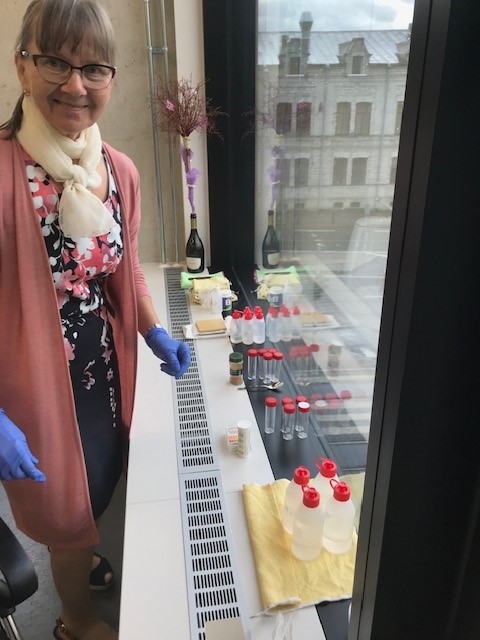info@puhastusekspert.ee +372 5611 1048
12 Fascinating Facts about Cleaning – Based on Scientific Research
We recently held a training session in cooperation with Tuula Suntamo, a true professional in her field. She holds a PhD in Chemistry from the University of Jyväskylä in Finland and has extensive experience in conducting research related to surface cleaning and applying research findings in practice.
We bring you 12 very fascinating facts about cleaning (based on scientific research findings) that Tuula highlighted during her training:
- One way to make cleaning safe for health is to avoid using spray bottles. Instead, a dampening bottle can be used, preventing substance particles from becoming airborne and entering our respiratory system.
- In the kitchen, the refrigerator handle is often dirtier than the floor. The refrigerator handle (and other handles on doors, drawers) are touch surfaces that must be cleaned regularly.
- Health problems (e.g., headaches, eye irritation, runny nose) can be caused by the interaction of particles from laser printers and fragrances (air fresheners, perfumes). If possible, keep printers in a separate room, not in the same room where people work.
- The most difficult grime to remove in shower rooms comes from cosmetic product residues. It is important to rinse and dry surfaces after each shower.
- Cleanliness can only be achieved with clean tools. If possible, keep brushes and floor squeegees/wipers in a hanging position, as the amount of bacteria on the tool increases significantly when left on the ground.
- The dirtiest items are usually everyday tools that are often forgotten to be cleaned – such as phones, TV remotes, or similar devices. These can be successfully cleaned with a slightly damp microfiber cloth.
- The most microorganisms, dirt, and sediment remain on surfaces if they are not dried. The best way to improve hygiene is to dry surfaces with a slightly damp, clean microfiber cloth.
- When choosing cleaning chemicals, prefer fragrance-free products (they may still have a raw material scent), as fragrances enter our body through the respiratory system and can cause allergies or irritations.
- The chair backrest is a touch surface that must be cleaned regularly. Often, chair backrests are left uncleaned, allowing a large number of bacteria and microorganisms to accumulate. These then transfer to our hands, enter our bodies, and are subsequently spread to other surfaces. Pay attention to other so-called hidden touch surfaces.
- According to measurements, school floors are cleaner than tables. Tables must be wiped with a slightly damp microfiber cloth during each cleaning. It is important to fold the microfiber cloth to ensure only a clean surface of the cloth is used during cleaning.
- The most effective method for daily cleaning is the slightly damp or damp method using a microfiber cloth. The wiping method can be identified using the mirror test – if no wipe marks are left on the mirror, it indicates a slightly damp method, and the surface does not need to be dried.
- Cleaning frequency affects indoor air quality. The more frequently cleaning is performed, the fewer airborne particles there are to be inhaled.
